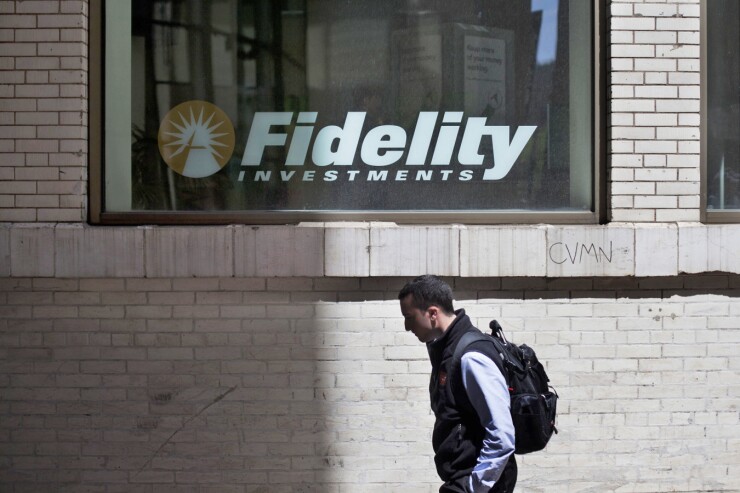An upcoming change to how Fidelity Investments handles cash balances has drawn ire from some in the industry who say it doesn't have clients' best interests in mind.
Next year Fidelity plans to convert its existing RIA non-retirement clients' cash balances from money market funds to its cash management product, FCASH, as first reported in
The current annual percentage yield on FCASH is 2.35% (with a 2.32% interest rate), while Fidelity's own Government Money Market Fund (SPAXX) posts a 4.27% SEC seven-day yield.
Sweeps and clients' best interest
The move comes at a time of
"All financial advisory firms ought to be focused on doing right by their clients," said Gary Zimmerman, founder and CEO of MaxMyInterest, a fintech platform that helps clients move their money to accounts with the highest interest yield, while keeping balances below the FDIC limits.
"For decades, brokerage firms have profited by taking client deposits and reselling them to other banks, via brokered cash sweeps, or lending them out at higher yields, keeping the spread for themselves," he said. "Given that there are now other higher-yielding options readily available in the market — including plain vanilla FDIC-insured savings accounts, some of which pay more than 4.5% today — defaulting all clients into a captive product that offers a dramatically lower yield would seem to run contrary to what's in the best interest of clients."
(Fidelity stated that it does not resell client deposits to other banks.)
Richard McWhorter, managing partner and private wealth advisor at
"I think that Fidelity, and all custodians that I have dealt with, are doing the same thing," he said. "The sweep function pays far less than what is available on the same platforms."
READ MORE:
Nick Richtsmeier, principal at brand strategy agency
"The custodians bet they could use cash to make back the money they weren't getting directly from RIAs or trading activity," he said. "Now the piper wants to get paid."
Richtsmeier said at Schwab, that will come in the form of an increase in referral fees,
"In both cases, the rollout is as much the news as the actual policy," he said. "Announcing less than 45 days before year-end that they were backtracking on high-yield cash while advisors are doing everything but thinking about their cash strategy for 2025 is just a bad client experience. But Fidelity seems to believe it has enough of a moat around its custody business that it can get away with it. RIAs have assumed the custodians are their supportive big brothers in the industry. They're being given all the signs they need to question that assumption."
READ MORE:
Tushar Kumar, private wealth advisor at
"However, such moves do pose challenges for clients seeking competitive returns on their cash," he said.
Advisors and active cash management
Trevor Norton, head of RIA and family office at Fidelity Institutional Wealth Management Services, said sweep accounts are intended to hold customer balances awaiting reinvestment.
"Advisors who prefer other cash options for their clients continue to have access to a wide array of short-term and long-term cash management choices with the ability to transact directly from those cash management vehicles," he said. "It is important to remember that advisors can still position trade into other investment options like money market funds, allowing them to actively manage their clients' cash in a way they feel is in the best interest of their clients and reflects their long-term financial goals."
READ MORE:
Norton said Fidelity understands that any changes to advisors' processes require planning, which is why the firm is providing advanced notice.
"Our dedicated team of relationship managers are working closely with custody clients to ensure they understand our policy update and are familiar with trading processes," he said. "Educating clients and providing top-tier service is one of our biggest priorities."
Kumar said Twin Peaks proactively moves excess client cash in FCASH into higher-yielding money market funds, typically every month or more frequently as needed.
"This ensures our clients earn competitive returns on their deposits," he said.
Additionally, Kumar said his firm offers access to a high-yield savings account through Flourish, providing clients with an FDIC-insured option for their savings needs. It also leverages tools like eMoney, a financial planning and account aggregation platform, to flag when clients are holding excess cash in low-interest accounts.
"For example, I recently worked with a client who had $600,000 in a checking account earning less than 0.5%," he said. "By reallocating those funds to a money market account earning over 4%, we generated an additional $24,000 in annual interest. The client was thrilled with the difference. These practices reflect our commitment to maximizing the value of every dollar our clients hold while ensuring alignment with their broader financial goals."
McWhorter said it is up to the advisor to make sure that they are optimizing the yields on the money markets as there is such a stark differential between the sweep and what is available at approximately 1.5% to 2.5%.
"Every morning, as funds come into the sweep money market, we have to review and purchase the higher-yielding money market options that are available so that our clients are optimizing their yield for these liquid funds," he said.
As an hourly fee-based practice, Randy Bruns, founder of
"Investors must buy into their higher-yielding money markets to invest in them, and sell shares to access funds," he said. "Although there are no transaction fees, it's a timely and cumbersome process at Schwab. Hopefully, Fidelity doesn't have such plans for its retail, non-RIA, clients."
— This story has been updated to include the current FCASH interest rate.






